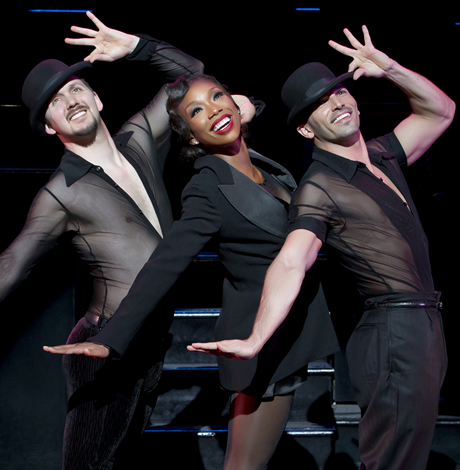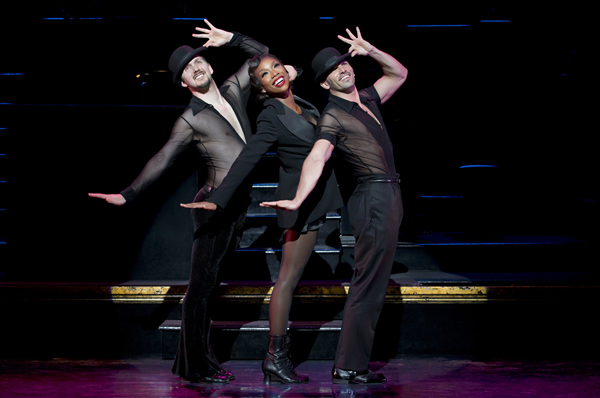Theater
SPRING ARTS 2017 — theater: More off-key singing
Signature’s ‘Mrs. Miller’ is musical heir of Florence Foster Jenkins


From left are Denny Paschall, Brandy Norwood and Michael Scirrotto in ‘Chicago.’ It comes to the Kennedy Center in April. (Photo by Jeremy Daniel)
The spring theater season is heavy on classics and musicals with a peppering of exciting new works. But a common thread throughout many of the upcoming productions is input from LGBT talent.
“Peter and the Starcatcher” a grownup prequel to the Peter Pan story is playing at Constellation Theatre through March 12. With all the familiar references — pirates, lost boys, spectacular mermaids and a crocodile — Rick Elice’s play with music and movement makes for an imaginative, fun romp. Staged by Kathryn Chase Bryer, Constellation’s production features a pleasing ensemble including Dallas Tolentino in the title role.
The Shakespeare Theatre Company has extended its stellar production of young British playwright Mike Bartlett’s “King Charles III” through March 18. What happens when Queen Elizabeth dies and Charles takes over? Bartlett has a few ideas. Later this season, the company presents Tony Award-winning playwright David Ives’ “The School for Lies” (May 30-June 2) based on Molière’s “The Misanthrope.” This update on the French comic masterpiece will be staged by STC’s out artistic director Michael Kahn.
At Olney Theatre Center, out actor Chris Dinolfo is playing in the new comedy “A Fancy French Farce” (through March 26), Meg Miroshnik’s adaptation of the 18th century comedy “The Double Inconstancy” by Pierre De Marivaux. Dinolfo plays the all-powerful prince who kidnaps a poor harlequin’s sweet young fiancée. Time tested comic mayhem ensues.
At Signature Theatre (through March 26) out librettist James Lapine (“Sunday in the Park with George”) is premiering his new work “Mrs. Miller Does Her Thing” starring Debra Monk in the title role. Similar to that other real life off-key song bird Florence Foster Jenkins, Mrs. Miller falls into the so-bad-she’s-good category. During the 1960s, Mrs. Miller found a following and put out some albums with covers of pop hits including “Downtown,” “Monday, Monday,” “A Hard Day’s Night,” which are included in the new musical.
Also at Signature, out director Matthew Gardiner is helming the world premiere production of “Midwestern Gothic” (March 14-April 30), a thriller with a musical twist by Royce Vavrek and Josh Schmidt. The cast includes Signature regulars Bobby Smith, Evan Casey and Rachel Zampelli as Luann.
At Studio Theatre, Jackson Gay is directing Anton Chekhov’s tragicomic masterpiece “Three Sisters” (March 8-April 23). Siblings Irina, Masha, Olga and Andrey pine for distant Moscow while struggling to find meaning in their current and future lives in provincial Russia.
In the third production of their acclaimed Small Batch Audience Series, Nu Sass Productions ( D.C.’s female-driven theater company) is presenting renowned writer/activist Howard Zinn’s “Marx in SoHo” (March 10-April 2). Mary Myers stars as Marx him/herself. Angela Kay Pirko directs.
At Ford’s Theatre it’s the epic musical “Ragtime” (March 10–May 20) by Stephen Flaherty (music) and Lynn Ahrens (lyrics). It’s adapted by out playwright Terrence McNally from E.L. Doctorow’s celebrated novel about three American families chasing the dream in turn of 20th century America. The large cast features talented Ford’s vets including Felicia Curry, Christopher Bloch, and Tracey Lynn Olivera. Peter Flynn directs.
Arena Stage’s impressive season continues with Lorraine Hansberry’s classic “A Raisin in the Sun” (March 31-May 7). The 1959 drama follows the aspirations of an African-American family seeking a better life away from their cramped apartment on Chicago’s Southside. Some of their dreams are realized while others are deferred. After Hansberry’s premature death from cancer at 34, a cache of letters were found indicating that the African-American playwright, though married to a man, identified as gay. The cast features Will Cobbs and talented local actor Dawn Ursula. Tazewell Thompson directs.
At the Kennedy Center, pop star Brandy is slated to play jilted killer Roxie Hart in “Chicago” (April 4-16). With a legendary book by Fred Ebb and Bob Fosse, music by John Kander, and lyrics by Fred Ebb, the 1920s Chicago-set musical puts the spotlight on jazz, mobsters, murder and public relations. Brandy’s first played Hart two years for a limited Broadway run.
Round House Theatre is premiering Liz Duffy Adams’ madcap comedy “Or,” (April 12-May 7). Inspired by Restoration comedy, it’s the wild story of up-and-coming playwright Aphra Behn who’s just landed her first commission for a professional company. There’s one snag — she must deliver her play by dawn. The top-notch cast includes out actor Holly Twyford, Erin Weaver and Gregory Linington.
In April, out actor Jaysen Wright makes his Arena Stage debut in “Smart People” (April 14- May 21), Lydia R. Diamond’s drama comedy about four intellectuals confronting themes of race, class, prejudice, identity and sexuality set against Obama’s 2008 election. Wright, a D.C. native, plays Jackson Moore, an African-American surgical resident at a Harvard-affiliated teaching hospital.
Also this spring, the national tour of “Fun Home” (April 18-May 13) the 2015 Tony Award winner for Best Musical is coming to the National Theatre. Adapted by Lisa Kron and Jeanine Tesori from Alison Bechdel’s 2006 graphic memoir of the same name, the musical follows the lesbian protagonist’s discovery of her own sexuality and her relationship with her gay father.
Rep Stage in Columbia, Md., is presenting the world premiere of Richard Mailman and Ryan Haase’s “Dorian’s Closet” (April 26-May14). The new musical is a fictionalized account of the life of Dorian Corey, the legendary drag performer widely known from “Paris is Burning,” the seminal 1990 documentary about the Harlem Ball scene. Incidentally, after Corey’s death from AIDS complications in the early 1990s, the mummified body of an ex-boyfriend who’d been shot in the head was discovered among her belongings.
And in May, Woolly Mammoth Theatre Company presents the sometimes outrageous out performance artist/playwright Taylor Mac’s daring black comedy “Hir” (May 22-June 18). It’s the story of a veteran who returns to his childhood home where things have changed considerably. His once timorous mother has begun a crusade to subvert the patriarchy. His sister is now a genderqueer anarchist and his abusive father now wears clown makeup. The cast features Woolly company members Emily Townley and Mitchell Hébert.
Theater
Theatre Prometheus spreads queer joy with ‘Galatea’
Two girls dressed as boys who find love despite the odds

‘Galatea’
Through May 10
Theatre Prometheus
Montgomery College Cultural Arts Center
7995 Georgia Ave, Silver Spring, Md.
$27
Theatreprometheus.org
In a timely move, Theatre Prometheus thought it would be a beneficial thing to spread a little queer joy. And since the company’s mission includes engaging audiences and artists in queer and feminist art, there was nothing to stop them.
Co-artistic directors Tracey Erbacher and Lauren Patton Villegas, both queer, agree they’ve found that joy in John Lyly’s “Galatea,” an Elizabethan-era comedy about Galatea and Phillida, two girls dressed as boys who find love despite some rather slim odds.
Now playing at Montgomery College Cultural Arts Center on the Takoma Park/Silver Spring campus, the upbeat offering is a mix of contemporary and period, and strives to make audiences happy. Galatea’s cast includes Amber Coleman and Cate Ginsberg as the besotted pair.
Erbacher, also the production’s director, adds “queer joy is something that I prioritized in casting actors and interviewing production people. I asked them what it means to them, and resoundingly the reply — from both them and the play — is that queer joy is the freedom to be yourself without having to think about it.
“Galatea” was first brought to Prometheus’s attention by Caitlin Partridge, the company’s literary director. Erbacher recalls, “she strongly suggested I read this very queer play. I read it and fell absolutely in love. And because it’s a comedy — I really like directing comedy — I knew that I could lean into that while not neglecting its universal themes of young love.”
Villegas, who’s not ordinarily drawn to the classics, was also instantly smitten with Galatea.
“Usually with classics, the language doesn’t jump out at me the way modern works do,” she says. “But not so with ‘Galatea.’ The first time I heard it read aloud, I found it easy to follow and entirely accessible in the best way.”
Whether Lyly deliberately wrote a queer play isn’t known. What’s definitely known is the play was written with an all-boy performing troupe in mind; that’s partly why there are so many young female roles, the parts 10-year-old boys were playing at the time.
There’s not a lot known about Lyly’s personal life, mostly because he wasn’t wildly famous. What’s known about the times is that there wasn’t a concept of “gay,” but there were sodomy laws regarding homosexual activity in England geared toward men having sex with men; it was all very phallocentric, Erbacher says.
She categorically adds, “Women’s sexuality wasn’t considered in the equation. In fact, it was often asked whether women were even capable of having sex with other women. It just was not part of the conversation. If there wasn’t a dick involved it didn’t count.
“Perhaps that’s how the playwright got around it. If there were two male characters in the play he could not have done it.”
Prometheus has done adaptations of ancient myths and some classics, but in this case it’s very faithful to the original text. Other than some cuts winnowing the work down to 90 minutes, “Galatea” is pretty much exactly as Lyly wrote it.
And that includes, “girls dressed as boys who fall in love thinking girls are boys,” says Erbacher. “And then they start to clock things: ‘I think he is as I am.’ And then they don’t care if the object of their affection is a boy or a girl, the quintessential bisexual iconic line.”
And without spoiling a thing, the director teases, “the ending is even queerer than the rest of the play.”
Erbacher and Villegas have worked together since Prometheus’s inception 11 years ago. More recently, they became co-artistic directors, splitting the work in myriad ways. It’s a good fit: They share values but not identical artistic sensibilities allow them to exchange objective feedback.
In past seasons, the collaborative pair have produced an all-women production of “Macbeth” and a queered take on [gay] “Cymbeline,” recreating it as a lesbian love story. And when roles aren’t specifically defined male or female, they take the best actor for the part.
With Galatea, Prometheus lightens the current mood. Erbacher says, “the hard stuff is important but exhausting. We deserve a queer rom-com, a romantic sweeping story that’s not focused on how hard it is to be queer, but rather the joy of it.”
Theater
Timely comedy ‘Fake It’ focuses on Native American themes
Arena Stage production features two out actors

‘Fake It Until You Make It’
Through May 4
Arena Stage, 1101 Sixth St., S.W.
Tickets start at $59
Arenastage.org
A farce requires teamwork. And Larissa FastHorse’s “Fake It Until You Make It” now at Arena Stage is no exception.
The timely comedy focuses on Native American nonprofits fractiously housed in a shared space. Friction rises when rivals River (Amy Brenneman), a white woman operating in the Indigenous world, goes up against the more authentic Wynona (Shyla Lefner) to win a lucrative Native-funded grant.
While Brenneman (best known for TV’s Judging Amy) is undeniably a big draw, it takes a group collaboration to hit marks, land jokes, and pull off the well-executed physical comedy including all those carefully timed door slams.
As members of the six-person “Fake It” cast, Brandon Delsid and Eric Stanton Betts, both out actors of partly indigenous ancestry, contribute to the mayhem. Respectively, Delsid and Betts play Krys and Mark, a pair of two-spirited Native Americans who meet farcically cute and enjoy one of the play’s more satisfying arcs.
For Krys, every attractive man is a potential next fling, but when Mark, handsome and relatively reserved, arrives on the scene, it’s something entirely different.
Both onstage and sometimes off, Betts plays the straight man to Delsid’s waggishness. But when it comes down to real life business, the friends are on the same page: not only are the L.A.-based, up-and-coming actors intensely serious about their film and stage careers, but they’re also particularly engaged in the themes of Indigenous People found in “Fake It.”
On a recent Wednesday following a matinee and an audience talkback, they were ready for a phone interview.
In establishing whose voice was whose, Delsid clarified with “I’m the one who sounds a little like a Valley girl.”
WASHINGTON BLADE: Brandon, you’ve been with the show since its early work-shopping days in 2022 and through its debut in Los Angeles and now Washington. Have things evolved?
BRANDON DELSID: Definitely. I’ve grown up in the last couple of years and so has my character; it’s hard to know where I end and Kry begins. There’s been a real melding.
Eric and I are both queer, and to get to play these roles that are so human, imperfect, sexy, and interesting is really joyful.
As queer artists you don’t always get the chance to do work like this. So many stories are queer trauma, which is incredibly important, but it’s liberating to feel joy and ride it off into the sunset, which, without revealing too much, is kind of what we get to do.
BLADE: There’s some race shifting in “Fake It” particularly with regard to “pretendian” (a pejorative term describing a person who has falsely claimed Indigenous status).
ERIC STANTON BETTS: The last few years I’ve been on a journey with my cultural identity and place in the world. I’m a mixed BIPOC artist, my dad is Black and Native American by way of the Cherokee tribe and my mom is white.
Since 2020, I’ve tried to figure out where I belong in this cultural history that I haven’t had a tie to throughout my life; it’s gratifying to find my way back to my indigeneity and be welcomed.
In the play, race shifting is introduced through farce. But it’s never in a disrespectful way; it’s never mocked or done in a way to take away from others. The playwright parallels race shifting with gender fluidity.
DELSID: But in life, there are people posing as Indigenous, actively taking grants, and the play goes there, we don’t hold back. Larissa, our playwright, has made it clear that she’s not trying to figure it out for us. With that in mind, we hope people leave the theater interested and curious to learn more.
BLADE: Mark arrives kind of the middle of some crazy drama, bringing along a jolt of romance.
BETTS: Yeah, when I show up, we’re all sort of shot out of a cannon, struggling to keep up with the initial lie.
DESLID: A very gay cannon.
BLADE: What’s up next for you two?
BETTS: Both Brandon and I are up for the same part in a TV pilot, so one of us may be getting some very good news. I also have a Tyler Perry film coming out soon [he plays a model, not an unfamiliar gig for Betts].
DELSID: Coming up, I have a recurring part on HBO’s “The Rehearsal,” and a supporting part in “June and John,” a Luc Besson film. But doing “Fake It Until You Make It” in L.A. and now D.C. has been a special time in our lives. It’s 23/7 togetherness. There’s that hour for sleep.
Theater
‘Bad Books’ a timely look at censorship in local library
Influencer vs. conservative parent in Round House production

‘Bad Books’
Through May 4
Round House Theatre
4545 East-West Highway
Bethesda, Md.
Tickets start at $43
Roundhousetheatre.org
While a library might seem an unlikely place for a heated contretemps, it’s exactly the spot where adults go when they’re itching to battle out what books minors might be allowed to read.
In Sharyn Rothstein’s “Bad Books,” two women, The Mother (out actor Holly Twyford) and The Librarian (Kate Eastwood Norris), swiftly become mired in a quarrel that comes with some weighty repercussions.
The Mother is a popular conservative influencer on a mission. She’s furious that the local library has overstepped its bounds and she blames The Librarian, a woman who adheres to the “it takes a village” method of child rearing and is dedicated to the young people who approach her reference desk.
There’s some background. It seems The Librarian who dresses young (tight jackets and Doc Martens) and curses a blue streak, forged a friendship with Jeremy, a teenage library regular.
While the details are a bit hazy, it seems the troubled Jeremy confided in The Librarian regarding some personal issues. In return, she suggested a helpful book – Boob Juice.
Unsurprisingly, based solely on its title, the book has thrown The Mother into a pique of outrage. After finding Boob Juice in her son’s bedroom, she made a beeline to the library; and not incidentally, The Mother hasn’t read the recommended work and has no plans to do so.
Set in a suburb with lax gun laws, the story explores facets of division and conciliation. The Mother insists she isn’t so much about banning books as she is keeping some books away from young people until they’ve obtained parental approval.
“Bad Books” is performed in the round. Built on a rotating stage, Meghan Raham’s set is simple, pleasingly serviceable, and easily transforms from the library into a small corporate office, and later the assembly room of a church. Overhead floats a circular glass shelf filled with a cache of banned books. Things like a rolling book cart and a goldfish bowl add some flavor to the different locations.
The Mother wasn’t always a popular conservative warrior with an enthusiastic horde of followers.
Her past includes penning a book that later filled her with guilt and regret. She refers to that early questionable literary accomplishment as her bad book. And while over the years, she has persevered to find and destroy each and every printed copy, she hasn’t entirely succeeded.
Norris plays three women who figure meaningfully into the arc of Twyford’s mother character. In addition to The Librarian, Norris is The Manager, a broadly played piece of comic relief, and The Editor, a warm woman who reveals things about Jeremy that his own mother never knew.
Smartly staged by Ryan Rilette, the production is part of a National New Play Network Rolling World Premiere. While Rothstein’s script offers two strong roles (skillfully performed by celebrated actors Twyford and Norris), its ending feels too neatly resolved.
In the past, Twyford and Norris have successfully joined forces for numerous DMV productions including Studio Theatre’s production of David Auburn’s two-hander “Summer, 1976,” the story of a longtime and unlikely friendship between two women who meet as young mothers during the Bicentennial summer.
Though different, both The Librarian and The Mother share a strong and ultimately hopeful relationship with words.
There’s a quote from E.B. White’s classic “Charlotte’s Web” that pops up a couple of times in the briskly paced 80-minute play. Charlotte, the wise spider, says, “with just the right words you can change the world.”
-

 The Vatican12 hours ago
The Vatican12 hours agoAmerican cardinal chosen as next pope
-

 a&e features18 hours ago
a&e features18 hours agoYour guide to the many Pride celebrations in D.C. region
-

 U.S. Supreme Court2 days ago
U.S. Supreme Court2 days agoSupreme Court allows Trump admin to enforce trans military ban
-

 District of Columbia2 days ago
District of Columbia2 days agoWorldPride permits for National Mall have yet to be approved












